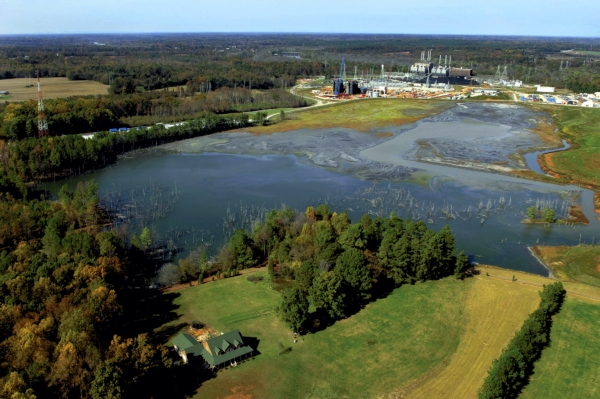State officials continue questioning own scientist’s coal ash claims
Published 12:10 am Wednesday, August 10, 2016

- A November 2010 aerial photograph of the first holding basin that was being used to hold the coal ash from the coal-fired Buck Steam plant seen in the background. JON C. LAKEY / SALISBURY POST
By Josh Bergeron
josh.bergeron@salisburypost.com
SALISBURY — The state’s latest attempt to discredit one of its own scientists comes in the form of an opinion piece that compares letters sent months apart to the same well owners.
In the column — sent Tuesday to media outlets across North Carolina — officials in Health and Human Services and the Department of Environmental Quality say state toxicologist Dr. Ken Rudo reached “questionable and inconsistent scientific conclusions” when making decisions about the safety of water near coal ash ponds. Rudo created “unnecessary fear and confusion” among neighbors of coal ash ponds, the state column says.
The column is published on page 6A of today’s Post.
It’s the most recent addition to a series of remarks that seek to question, criticize or discredit Rudo. The first critical remark came last week, when the governor’s chief of staff rejected claims contained in a deposition given by Rudo. On Monday, a top Democrat in the N.C. House called for an investigation because of claims contained in the document. If they weren’t already there, Rudo’s deposition has firmly cemented coal ash conversations in North Carolina’s political realm.
With the Tuesday opinion piece, DEQ Assistant Secretary for the Environment Tom Reeder said state government wants to “correct the record.”
“We’re just trying to correct some of the misperceptions out there,” said DEQ Assistant Secretary for the Environment Tom Reeder in an interview with the Salisbury Post. “Dr. Rudo gave this deposition, which we disagree with many of the points that are in it … It was released to the press and we don’t agree with a lot of the points he made in that deposition, and we’re just trying to point out that it was incomplete and there are two sides to the story.”
In Rudo’s deposition, he claimed state officials acted unethically and possibly illegally in telling coal ash pond neighbors that their well water was safe to drink. Rudo also said he was summoned to a meeting at Gov. Pat McCrory’s office.
Tuesday’s essay from Reeder and State Health Director Randall Williams says that Rudo has “contradicted himself” in environmental assessments of water wells near coal ash ponds. Specifically, Rudo “contradicted himself” when deciding the amount of certain metals that should be allowed in drinking water.
“Rudo’s unprofessional approach to this important matter does a disservice to public health and environmental protection in North Carolina,” the piece states.
In reference to the opinion piece, a DEQ spokesman sent the Salisbury Post copies of November 2014 letters and June 2015 letters for the same houses on Leonard Road. Reeder said the initial, 2014 letters were sent in response to requests from local residents. The 2015 letters were a result of the Coal Ash Management Act.
In 2014, water in the wells on Leonard Road in Rowan County was declared safe to drink, and levels of metals hexavalent chromium and vanadium both were below federal standards, according to letters provided by DEQ. At the time, however, DHHS had not established a its health screening level for the metals.
In an email about the state’s opinion piece, Waterkeeper Alliance Attorney Pete Harrison contended that a number of wells tested in 2014 exceeded a groundwater standard that’s always been in effect. However, only one well exceeded an alternative standards that was being applied at the time.
Regardless of scientific details, the criticism of Rudo raises a simple question for Dukeville resident Deborah Graham.
“If he was not competent enough to do his job, wouldn’t he have been fired years ago?” Graham asked. “It seems like nobody questioned him back then, but now he is a liar and a mad scientist. It’s all coming out now.”
Graham said that Rudo is the only state official that she trusts. She has called McCrory’s office “30 to 40 times” and never received a call back. Williams doesn’t respond when she calls his office. Rudo is the only one who has taken the time to talk to with coal ash neighbors about water quality, she said.
“The state itself is turning their back and questioning their own person and it just makes no sense,” Graham said.
She noted that Rudo’s deposition was under oath. It’s a crime if he lied during his deposition.
Reeder, however, said he’s willing to talk about any part of North Carolina’s coal ash controversy under oath.
“I’ve given many depositions,” Reeder said. “I’ve given depositions on this exact same subject. I’ve given lots of depositions. I’ll go under oath any time.”
Currently, water in most wells in the Dukeville area is officially “safe to drink,” according to state health officials. Most of the initial letters declaring the wells unsafe to drink were rescinded. In part, state officials rescinded the letters because the state’s health screening levels are more stringent than what’s allowed in municipal water.
The Tuesday piece from Reeder and Williams says staff at the state’s environmental department “found it untenable” that Rudo wouldn’t expand health screening levels to water wells outside of an area immediately adjacent to coal ash ponds.
When asked about the most important part of the coal ash controversy for Dukeville residents, Reeder said, “All they need to know is that they’re being provided with bottled water now and under the new (coal ash law) they will be provided with permanent, alternate water.”
Contact reporter Josh Bergeron at 704-797-4246.





